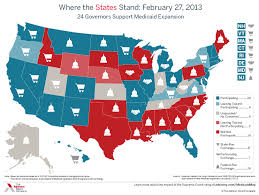States that decline to expand Medicaid give up billions in aid
< < Go Back
By Tony Pugh,
If the 23 states that have rejected expanding Medicaid under the 2010 health care law continue to do so for the next eight years, they’ll pay $152 billion to extend the program in other states _ while receiving nothing in return.
This massive exodus of federal tax dollars from 2013 through 2022 would pay 37 percent of the cost to expand Medicaid in the 27 remaining states and Washington, D.C., over that time.
Most of the money, nearly $88 billion, would come from taxpayers in just five non-expansion states: Texas, Florida, North Carolina, Georgia and Virginia.
The findings are part of a McClatchy analysis of data from the Urban Institute, a nonpartisan research center that’s advised states on implementing the health care law, the Affordable Care Act.
Here is money that is pretty much there for the asking, and these states are turning it down. And in the meantime, their taxpayers are paying taxes that fund expansions in states that are moving forward. It just doesn’t make any sense,” said Sherry Glied, the dean of the Robert F. Wagner Graduate School of Public Service at New York University.
The federal funding under Medicaid expansion also would stimulate economic activity, boost tax revenue and create hundreds of thousands of jobs in the non-expansion states, experts say.
“This additional use of medical services not only brings more federal dollars, but hospitals, physicians and pharmacies would likely hire more people, keep longer hours and probably raise wages. All of which leads to indirect spending and subsequent rounds of spending that generate tax revenues and, in general, the expansion of the economy within states,” said Michael Morrisey, a health economics professor at the University of Alabama at Birmingham.
Expansion opponents doubt the federal government’s long-term ability to fund 90 percent of the cost for new enrollees. They also worry that their states can’t afford the increased Medicaid costs that come with expansion.
“We’re already struggling as a state, financially, to find the money to support our existing Medicaid system,” said Georgia Republican state Rep. Jason Shaw. “It’s really tough times for the state. It just wouldn’t be fair to the taxpayers if we just accepted the expansion.”
Some critics think the expansion encourages government dependency by providing free and low-cost health coverage for some while requiring those with higher incomes to pay full price. Those concerns have made expansion a tough sell in the holdout states, where Republican lawmakers want to curb enrollment growth in Medicaid no matter how sweet the financial incentives may be.
Last week, Pennsylvania became the ninth state with a Republican governor to accept the expansion. Like Arkansas and Iowa, Pennsylvania won approval from the Obama administration to bypass the Medicaid program and use the federal funding to help low-income residents buy private coverage instead.
But in the run-up to the first midterm elections since the health law was fully implemented, expansion remains a hot-button issue. While polls show the Affordable Care Act remains largely unpopular, Democratic candidates in Republican-led states are campaigning for the expansion, citing the financial benefits.
Medicaid is a key element of the Affordable Care Act’s goal to provide near-universal coverage for millions of Americans. Since last October, more than 7.2 million people have gained Medicaid coverage, largely through the expansion.
But pursuing expansion based on a state’s potential loss of funding “assumes federal funds come from nowhere,” said Drew Gonshorowski, a senior policy analyst at the Heritage Foundation, a conservative policy research group. “We have to think about this as redistribution rather than creation of new funds for the state.”
Since taxpayers nationwide fund each state’s Medicaid expansion, non-expansion states are serving the fiscal interests of the nation by helping to reduce federal spending, Gonshorowski said.
Expanding Medicaid coverage in the 23 remaining states would increase their state budget costs by $28.8 billion from 2013 through 2022, the Urban Institute reports. Expansion in Georgia, for instance, would hike its expenses by $2.5 billion over the 10 years, according to the institute.
“We simply cannot afford the $2.5 billion in new spending that expansion would require,” said Sasha Dlugolenski, a spokeswoman for Gov. Deal. “I think everyone can agree on one thing: The expansion costs money the state does not have.”
More From Fort Worth Star Telegram:




